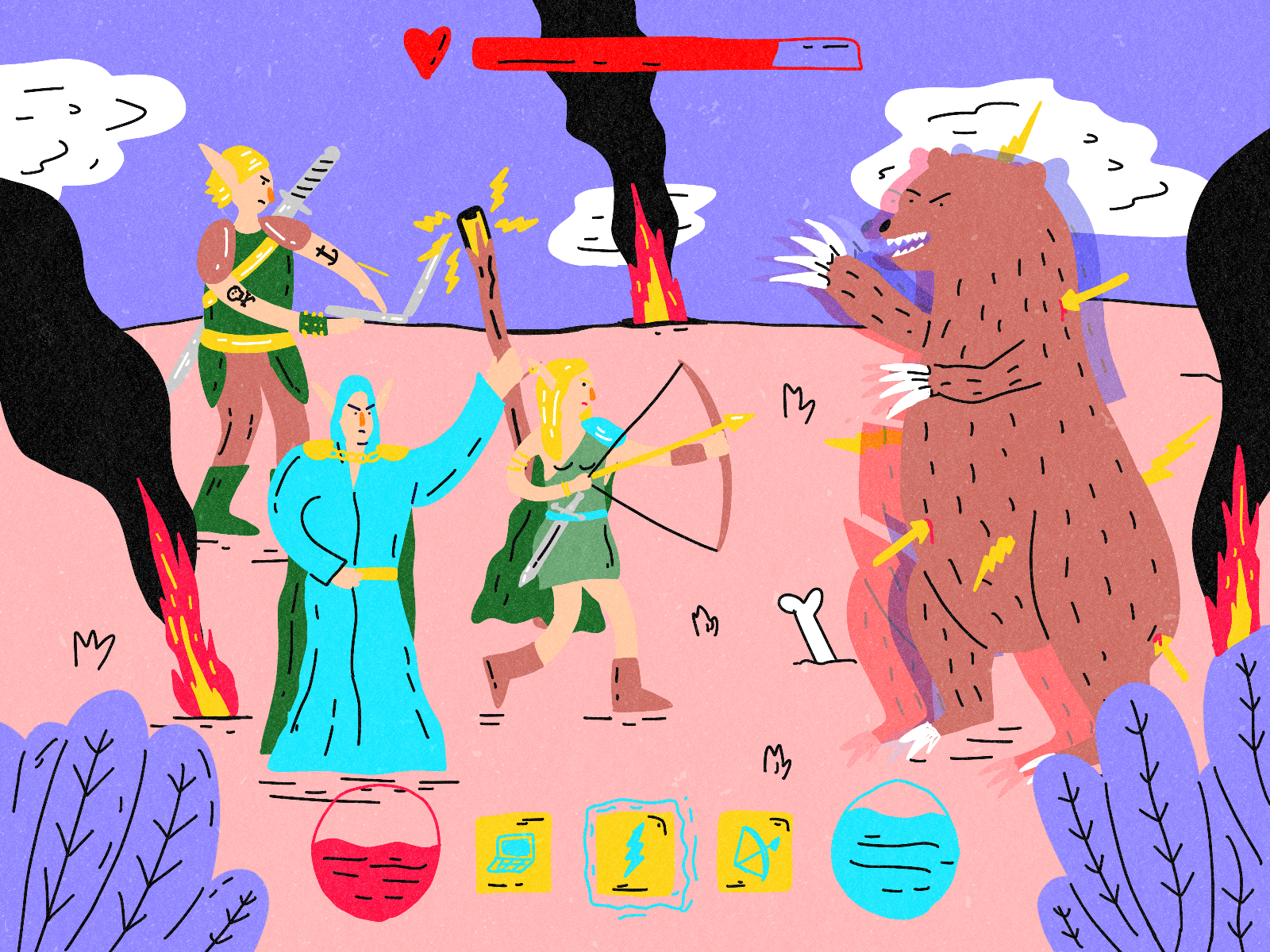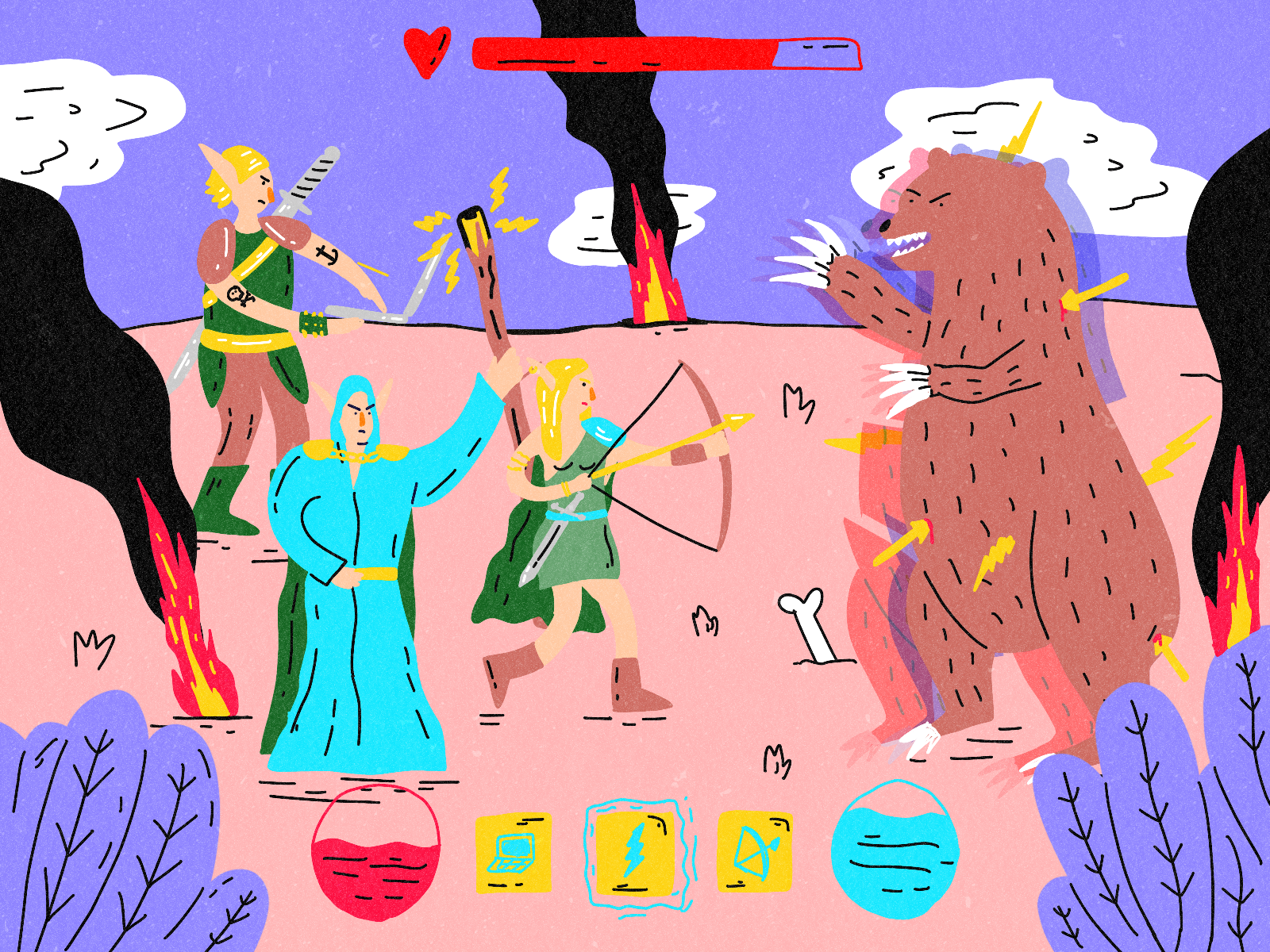Fake news, fake demonstrations, and incitement against NATO. The war is also being waged online. Russian, often paid, internet trolls are being countered by a secretive Lithuanian volunteer group: the Elves. From less than 50 Lithuanians at the beginning, there are now thousands of active elves in Lithuania and abroad. Analysis from Hype&Hyper.
The „Norns” are a group of supernatural beings in Norse mythology. Elves are Norns who treat humans with benevolence and shape them in a positive way, but unfortunately, not all Norns are elves. Some are gods, while others are trolls who want to harm humans. They are fearsome, evil creatures living in dark caves. But, nowadays, a troll means something different to us, especially in the context of the Internet: a troll is a provocative person who incites and bullies others on social media platforms. But who will fight these trolls?
Lithuanian elves against Russian trolls
The movement of the unique, modern elves was born in Lithuania in 2014, after the Maidan Upspring in Ukraine, when clashes broke out between protesters and the pro-government forces backed by the pro-Russian Ukrainian President Viktor Yanukovych. Shortly afterward, Russia invaded Ukraine and occupied parts of the country. The conflict has also spread to the online space, as the events in Ukraine have been followed by disinformation attacks and a constant flood of propaganda.
These trolls did not and still do not spread fake news and propaganda for free. A reporter of the Fontanka newspaper has joined a troll army based in St Petersburg, where the salary was 500 euros (HUF 190 000) a month for posting comments on social media, Sky News reports.

The turmoil in Ukraine has encouraged a group of forty like-minded individuals to start tackling the pro-Kremlin trolls in the online media. A network has been established, bringing together experts with different backgrounds, such as foreign policy, cybersecurity, IT, economics, and environmental protection. The group members began calling themselves elves, as they had formed as a counterforce to the pro-Kremlin trolls.
„We needed to call our group something. What to name it? Well, we were fighting trolls. So, I said: Let’s be elves.” – explained Mindaugas, one of the founders of the movement in Lithuania.
The movement eventually expanded to the two other Baltic countries and later to other states, including Czechia, Finland, Slovakia, and Ukraine. In 2021, the first Western European chapter was established in Germany. Their ever-changing membership now numbers thousands of volunteers, including journalists, IT professionals, business people, students, and academics.
The members are all volunteers; thus, the movement is independent of states and governments, and they claim that their activity is entirely legal. They strongly condemn all forms of criminality, such as hacking or cyber espionage, and primarily focus on monitoring Russian disinformation and its perpetrators, such as trolls. The group initially worked anonymously. As one of the founders of the elf movement told The Independent, the Elves are a „strictly defensive force that does not carry out cyber-attacks or disseminate counter-propaganda.”
But they have now been involved in attacks
Since the Russo-Ukrainian war broke out, the Lithuanian Elves have been actively involved in DDoS attacks against Russian and Belarusian state institutions, propaganda centers, and infrastructure sites. According to their leader, Hawk, they support their Ukrainian brothers and sisters by fighting online. The well-known hacktivist group Anonymous has also been actively involved in these attacks, which blocked access to many websites for days, from private banks to RT and Sputnik or even to the Russian Ministry of Defence.
There are different types of modern elves. While some are unbeatable debunkers of false information, others run online campaigns against pro-Kremlin trolls. Since its formation, the group has had its own monitoring tool to track hostile comments on news sites. They started coordinating the flagging of fake news comments under online articles and eventually created a secret Facebook group about Yorkshire Terriers to avoid being noticed. In this group, anyone could alert others about fake news or other propaganda circulating on the Internet, and they could collectively report it. Volunteers mainly check the content the automated artificial intelligence system might have missed.
“We do it on a level that is understandable to average people. We try to explain what disinformation is. We fight against toxic trolls by trying to take them off social networks and by reporting them in an organized way.” – said the Elves’ leader, Hawk.
What is more, there are psychologists among the elves who monitor the trolls’ behavior. Mindaugas, one of the founders, said that they are trying to find out the identity of the trolls, or at least to find out which country and city they come from. However, he added that it is a challenging task.
Mindaugas experiences that communication is becoming even more intensive among the group members. He has created a Google Group where elves leave comments, tips, and observations for each other. Sometimes the elves get to know each other’s real names and meet for a coffee, but mostly they do not know each other’s identities. They are deliberately hiding it so the trolls cannot find them. „Like all spies, we are also engaged in counter-espionage,” Mindaugas told LRYTAS.LT about what he has to do to protect himself.
The battle against disinformation is already being waged offline too
These days, Mindaugas and his fellow activists have also been fighting pro-Russian provocateurs on the streets. Protests staged by pro-Kremlin provocateurs are common in Vilnius, organized by strange groups and funded by obscure sources.
They gather with placards in front of the US embassy or the Lithuanian Presidential Palace and organize demonstrations condemning NATO, the US, and the EU. These rallies are filmed by Russian media sources and presented as the Lithuanian majority’s opinion. Lithuanian elves fight back Kremlin trolls by demonstrating in the streets with American or EU flags and laughing as they mingle with the pro-Kremlin protesters. This makes it difficult for the pro-Russian camera operators to film the dissatisfied people who condemn the EU and the US in theory. Mindaugas believes that the elves who disrupt the pro-Kremlin protests are often photographed, and their photos are uploaded to the Internet in order to identify them. Many fear that the small troll protests will turn violent once. The activist fears that the pro-Kremlin forces will use the same methods to provoke violence as in Ukraine. He revealed that he bought a gun and added that, if necessary, they would defend their homes not only with words but also with weapons.
We are not even safe in a fitness group
Imagine that you join a lifestyle group because you feel you need some tips and encouragement to change your diet or start to work out. At first, you will be attracted by the community and get a lot of interesting advice, but sometimes you start to notice short political posts too. Then you start to see more of these messages, either as comments or posts, and you begin to perceive the messages, news, and theories you read in the group as the majority’s opinion. They are starting to become more credible for you.
The founders of the elf movement noticed this phenomenon on Facebook: they discovered many groups seemingly dedicated to meditation, fitness, or healthy lifestyles, but after more profound examination, they realized that these groups are used to spread pro-Kremlin propaganda.
Bohumil Kartous, the spokesperson for the Czech Elves and director of Prague Innovation Institute, thinks that Czech pro-Kremlin groups have mainly focused on promoting Czech populist political parties, especially the far-right SPD and the communist KSČM.
Kartous added that „some of them are copying Kremlin propaganda, as usual, but some of them try to discredit and diminish the stance of the Czech government, which is strongly pro-Ukrainian. Some even attack the goodwill to help refugees with an emotional appeal to what about our [Czech] people in need.”
Kartous and the Czech volunteers monitor and analyze known fake news websites and many pro-Kremlin groups and pages on Facebook. So far, the polls show that Czechs are immune to the propaganda, but Kartous is still afraid that this could, unfortunately, change as the war goes on.
As in Czechia, the Russian disinformation actors in Slovakia have focused primarily on pushing Slovaks dissatisfied with the current political direction of their country toward advocating closer ties with Russia. Tomáš Kriššák, a cognitive security expert, revealed that the pro-Kremlin trolls’ target group included politicians, academics, and even students.
The expert illustrated the harsh and horrific reality: “When they bombed a hospital or a theatre filled with civilians [in Mariupol], they simply said they were bombing Azov soldiers hiding in the place.” The Azov Regiment is a controversial far-right Ukrainian military unit that is part of the country’s National Guard. It is often portrayed in Russian propaganda as a neo-Nazi armed group.
Other fake news has also proliferated in the region, which is particularly dangerous because „many people do not really read beyond the headlines,” says Vaidas Saldžiūnas, defense editor of DELFI, a Baltic media organization. For example, a hacker group managed to smuggle a fake story about a NATO plan to invade Belarus into a news agency’s feed for a week.
A pro-Kremlin online newspaper published a story that a US soldier stationed at a NATO base in Lithuania had COVID-19. The story was fake, but several other media outlets picked it up. According to a ministry analyst, the aim was to convince Lithuanians who are uneasy about NATO that the foreign soldiers are a threat to the country.
The suppression of disinformation raises questions about silencing legitimate political views, although, in theory, there are some good controls to prevent it. Ričardas Savukynas, a 43-year-old business consultant, blogger, and elf, said in an interview for LRT.lt. that if the topic is a political debate, it is not their business. The Kremlin tries to portray them as censors and often lies about everyone who fights pro-Russian propaganda. They claim that elves’ job silences freedom of speech since it prevents people from complaining to the authorities. „I always say that we need to talk about the problems in Lithuania because if we do not, the Kremlin will,” Savukynas concluded.
Psychologist Stephen Lewandowsky and his team have conducted many studies on how people accept disinformation. Once they have accepted false information, it is difficult to change their minds, and constant explanations of the facts or arguments can even reinforce their belief in the conspiracy. According to Lewandowsky, it is almost impossible to change the minds of people with stable convictions. It is, therefore, better not to use radical statements in our communication.
They mostly work secretly, but a few elves talk to the press
„Mindaugas is an unassuming 30-something advertising director by day and a ferocious cyber-warrior by night.” He started the movement in Lithuania against Kremlin propaganda and disinformation on the Internet. For Ričardas Savukynas, the fight he is fighting is not a fantasy. Savukynas is a member of an informal Lithuanian internet army trying to combat hate speech and pro-Russian propaganda. He focuses on writing and runs a personal blog dedicated to, among other things, deconstructing Soviet nostalgia and debunking conspiracy theories.
The organization’s leader is a middle-aged former e-commerce businessman who does not want his identity to be revealed for security reasons. He is known as Hawk, which is his online pseudonym. He has long accepted that if the GRU (Russia’s military intelligence agency) really wants to discover his identity, they can, but he is trying to minimize the risks, especially for the safety of his family.
Lithuanian actor Henrikas Savickis is also an elf, constantly monitoring social media posts to identify fake news about current events in Ukraine. Lithuanian MP Jurgita Sejoniené joined the Elves too; the Vilnius-based radiologist was shocked by the disinformation about COVID-19 she saw online, so she decided to join the group to combat fake news. She added to Time magazine with a mischievous smile that most of her constituents do not know she is an elf.

The story of Chinese investments in Central and Eastern Europe

Marcel Breuer’s brutalist building from the 70s reopened under the name Hotel Marcel










